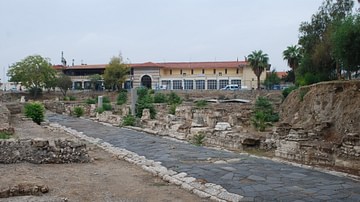Search
Did you mean: Visigoth?
Search Results

Definition
Pantheon - Rome's Best-Surviving Building
The Pantheon (Latin: pantheum) is the best-preserved building from ancient Rome and was completed in c. 125 CE. Its magnificent concrete dome is a lasting testimony to the genius of Roman architects. As the building stands virtually intact...

Definition
Plato
Plato (l. 424/423 to 348/347 BCE) is the pre-eminent Greek philosopher, known for his Dialogues and for founding his Academy in Athens, traditionally considered the first university in the Western world. Plato was a student of Socrates and...

Definition
James I of England
James I of England (r. 1603-1625), who was also James VI of Scotland (r. 1567-1625), was the son of Mary, Queen of Scots, and he unified the thrones of Scotland and England following the death of Queen Elizabeth I of England (r. 1558-1603...

Definition
Jerusalem
Jerusalem is a major holy city for the three Western traditions of Judaism, Christianity, and Islam. It sits on spurs of bedrock between the Mediterranean Sea and the Dead Sea area. To the north and west, it tapers off to the Jezreel Valley...

Definition
Bacchus
Bacchus was the god of wine and revelry in Roman mythology. Considered the most versatile and elusive of the gods, with a Greek equivalent in Dionysus, Bacchus is frequently associated with the Roman god of wine Liber Pater. He brought joy...

Definition
Pompeii
Pompeii was a large Roman town in Campania, Italy which was buried in volcanic ash following the eruption of Mt. Vesuvius in 79 CE. Excavated in the 19th-20th century, its excellent state of preservation gives an invaluable insight into Roman...

Definition
Delphi
Delphi was an important ancient Greek religious sanctuary sacred to the god Apollo. Located on Mt. Parnassus near the Gulf of Corinth, it was home to the famous oracle of Apollo which gave cryptic predictions and guidance to both city-states...

Definition
Deir el-Medina
Deir el-Medina is the modern Arabic name for the worker's village (now an archaeological site) which was home to the artisans and craftsmen of Thebes who built and decorated the royal tombs in the nearby Valley of the Kings and Valley of...

Definition
Tarsus
Tarsus was a city in ancient Cilicia located in the modern-day province of Mersin, Turkey. It is one of the oldest continually inhabited urban centers in the world, dating back to the Neolithic Period. It was built close by the Cydnus River...

Definition
Ptolemaic Egypt
Ptolemaic Egypt existed between 323 and 30 BCE when Egypt was ruled by the Macedonian Ptolemaic dynasty. During the Ptolemaic period, Egyptian society changed as Greek immigrants introduced a new language, religious pantheon, and way of life...